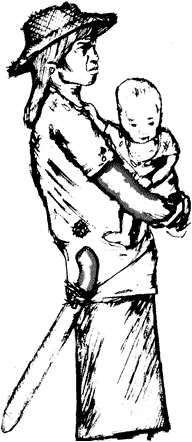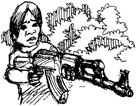The intense oppression of women peasants
Women comprise half of the Filipino peasantry which make up 70% of the national population. Like the rest of the peasantry, they suffer from intolerable oppression and exploitation due to the feudal and semifeudal order in the countryside. Peasant women and men alike bear the problem of not having enough land to till. Moreover, a sizeable portion of their produce meant for their consumption and income generation is appropriated by the exploiting classes through exorbitant land rent and production costs, usury and low farmgate prices. Farm workers, both men and women, receive meager wages.

Peasant women are more exploited compared to the men of the peasantry. Women suffer from low status in a semicolonial and semifeudal society. In the countryside, their roles are often confined to that of being housewives and mothers whose responsibilities are limited to family matters.
Their significant role in production is not even recognized in official statistics. One study reveals that only 47.55% of rural women are actually included in the labor force. On the other hand, 84.24% of men are considered part of the rural workforce.
In addition, rural women usually earn wages or incomes that are even lower than the measly wages men receive. According to a 1997 survey by the National Statistics Office (NSO), men are paid P14.92 more than women for a day's work. The real wage of men is P6.26 higher than women's.
The NSO adds that 52% of the 2.96 million women farm workers in 2002 were classified as unpaid family workers.
In rice and corn lands, women receive only P80 in daily wages while men are paid P100.
Women in other areas are paid even less. In Negros, women working as seasonal farm hands receive only P50 a day. In weeding, where the contractual pakyaw system is employed, 15-20 women are paid only P600 per hectare covered. The women's lower wages make it even harder for their families to earn P398.28 daily, the amount the government considers necessary for a family of six in agricultural areas.
Ever since the government thrust the Philippine economy into the "globalization" framework by joining the General Agreement on Tariffs and Trade and the World Trade Organization (WTO), the country has been swamped by cheap agricultural imports. This has caused the further decline of agricultural production and peasant incomes. The number of unemployed rural women has grown, a fact that not even the government's manipulated statistics could hide. The documented unemployment rate among rural women grew from 8.4% in 1988 to 10.1% in 1998. It rose to 10.6% in 2001, three years after the country's entry to the WTO.
"Globalization's" continued devastation of the peasants' lives and livelihood is forcing women to leave their communities to seek jobs elsewhere. They often find work as salesladies, laundry women and domestic helpers in town centers or in Metro Manila. Or, if they manage to go abroad, they land jobs as domestic helpers if not entertainers. Due to the enormous lack of opportunities to find decent jobs, many are forced into prostitution and other antisocial activities just to earn money.
Militarization in the countryside is another severe blow on the peasant masses' lives and livelihood. It has wrought mounting human rights violations. Aside from murders, abductions, illegal arrests, forced evacuation and destruction of crops and property, many women fall victim to sexual abuse by military and paramilitary forces. In Cordillera alone, there were 25 recorded cases of rape, attempted rape and sexual harassment between 1986 and 2002.
More than ever before, it has become necessary for women to crush the rotten system prevailing in Philippine society.
Women, like men, have the right to take part in production and enjoy the benefits of development and social services, among other gains. They have the equal right to participate in politics and other affairs outside the home and to develop their talents and capacities as citizens.

| 
